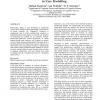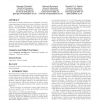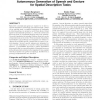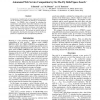211 search results - page 15 / 43 » Expressive Planning and Explicit Knowledge |
IUI
1997
ACM
13 years 11 months ago
1997
ACM
Historically, efforts at user modelling in educational systems have tended to employ knowledge representations in which symbolic (or "linguistic") cognition is emphasize...
ATAL
2010
Springer
13 years 8 months ago
2010
Springer
Social norms enable coordination in multiagent systems by constraining agent behaviour in order to achieve a social objective. Automating the design of social norms has been shown...
ATAL
2009
Springer
14 years 2 months ago
2009
Springer
Embodied conversational agents are required to be able to express themselves convincingly and autonomously. Based on an empirial study on spatial descriptions of landmarks in dire...
AIPS
2006
13 years 8 months ago
2006
Composition of stateful web services expressed in BPEL4WS can be recasted as a problem of planning in asynchronous domains. In (PTB05), this is pursued by encoding the asynchronou...
ATAL
2005
Springer
14 years 29 days ago
2005
Springer
This paper presents a logic of knowledge, belief and certainty, which allows us to explicitly express the knowledge, belief and certainty of an agent. A computationally grounded m...




